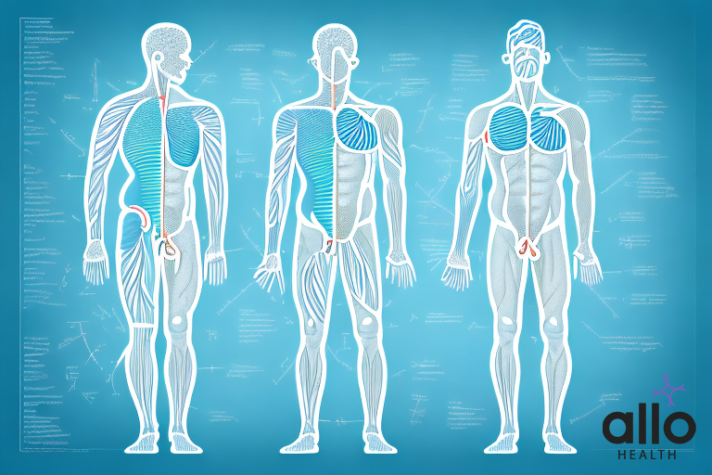Difference Between Psychogenic Vs. Organic Erectile Dysfunction

Allo Health is dedicated to personalized well-being, offering support and trusted information tailored to individual health goals. The platform emphasizes human-generated content, led by a distinguished medical team of experts, including physicians and sexual health specialists. Their commitment to credibility involves rigorous fact-checking, authoritative research, and continuous updates to ensure accurate, up-to-date information. Allo Health's unique approach goes beyond conventional platforms, providing expert-led insights and a continuous commitment to excellence, with user feedback playing a crucial role in shaping the platform's authoritative voice.

Dr. Aditi completed her undergraduate medical education at AJIMS, Mangalore, after which she worked in multi-speciality hospitals with COVID patients and in the Pain and Palliative medicine department. Driven by her experiences, she developed a keen interest in psychiatry. Dr. Aditi believes that mental health is just as, if not more important, than physical health.
Why This Was Upated?
Our experts continually monitor the health and wellness space, and we update our articles when new information became available.
Updated on 18 June, 2024
- Article was updated as part of our commitment to diversity, equity, and inclusion.

"The following blog article provides general information and insights on various topics. However, it is important to note that the information presented is not intended as professional advice in any specific field or area. The content of this blog is for general educational and informational purposes only.
Book consultation
The content should not be interpreted as endorsement, recommendation, or guarantee of any product, service, or information mentioned. Readers are solely responsible for the decisions and actions they take based on the information provided in this blog. It is essential to exercise individual judgment, critical thinking, and personal responsibility when applying or implementing any information or suggestions discussed in the blog."
Erectile dysfunction (ED) is a condition that affects men of all ages, but it becomes more common as men get older. ED can have both physical and psychological causes, and it’s essential to understand the difference between the twoa. Psychogenic erectile dysfunction is caused by psychological factors such as stress, anxiety, depression, or relationship concerns, while organic erectile dysfunction is due to physical causes such as diabetes, high blood pressure, or hormonal imbalances. Both types of ED can have a significant impact on a man’s self-esteem, relationships, and overall quality of life.
What Is Psychogenic Erectile Dysfunction?
Psychogenic erectile dysfunction (ED) refers to a situation where a man is unable to achieve or maintain an erection due to psychological factors rather than physical causes. While physical concerns like blood flow concernss, hormonal imbalances, or nerve damage can contribute to erectile dysfunction, psychogenic factors involve emotions, thoughts, and behaviors that interfere with sexual function.
Here are some key aspects of psychogenic erectile dysfunction:
- Psychological Causes:
- Anxiety and Stress: High levels of stress or anxiety can interfere with the normal sexual response. Performance anxiety, in particular, can be a significant factor.
- Depression: Mood disorders, such as depression, can affect a person’s libido and ability to engage in sexual activity.
- Relationship concerns: Concerns within a relationship, such as communication concerns, unresolved conflicts, or lack of emotional intimacy, can contribute to ED.
- Low Self-Esteem: Negative self-perception or low self-esteem can impact sexual confidence and performance.
- Emotional Factors:
- Fear of Failure: The fear of not being able to perform sexually can create a self-fulfilling prophecy, leading to erectile difficulties.
- Guilt or Shame: Feelings of guilt or shame related to sexuality, past experiences, or personal beliefs can contribute to ED.
- Worry: Excessive worry about various aspects of life, including work, finances, or personal concerns, can divert attention away from sexual stimuli.
- Behavioral Factors:
- Unhealthy Lifestyle Choices: Smoking, excessive alcohol consumption, and drug use can contribute to both physical and psychological factors leading to ED.
- Lack of Physical Activity: Sedentary lifestyles and a lack of regular exercise can impact overall health, including sexual function.
- Poor Sleep Habits: Inadequate sleep or sleep disorders can contribute to stress and fatigue, affecting sexual performance.
- Diagnosis and Treatment:
- Diagnosis of psychogenic ED involves a thorough medical and psychological assessment. It’s important to rule out any underlying physical causes.
- Treatment often involves a multidisciplinary approach, including counseling or psychotherapy to address underlying psychological concerns. Couples therapy may also be beneficial in resolving relationship concerns.
- Medications, such as phosphodiesterase type 5 (PDE5) inhibitors (e.g., sildenafil, tadalafil), may be prescribed to address the symptoms. However, these medications do not directly address the psychological causes.
- Prognosis:
- Psychogenic ED generally has a good prognosis when the underlying psychological concerns are identified and addressed. Successful treatment often involves a combination of psychological interventions, lifestyle changes, and, if necessary, medication.
It’s essential for individuals experiencing erectile dysfunction to seek professional help from healthcare providers, including urologists or mental health professionals, to determine the root causes and develop an appropriate treatment plan.
Difference Between Psychogenic Vs. Organic Erectile Dysfunction
Erectile dysfunction (ED) can be categorized into two main types: psychogenic and organic (or physical). Understanding the differences between psychogenic and organic ED is crucial for accurate diagnosis and effective treatment. Here’s a detailed comparison of the two:

Psychogenic Erectile Dysfunction:
- Causes:
- Psychological Factors: Psychogenic ED is primarily caused by psychological factors, such as stress, anxiety, depression, relationship concerns, or emotional concerns.
- Performance Anxiety: Fear of performance or concerns about sexual performance can contribute to psychogenic ED.
- Onset:
- Sudden Onset: Psychogenic ED may have a sudden onset, often related to a specific psychological trigger or event.
- Physical Health:
- Generally Healthy: Individuals with psychogenic ED typically have no underlying physical health concerns affecting erectile function.
- Response to Sexual Stimuli:
- Variable Response: Erectile function may vary depending on the individual’s psychological state, emotional well-being, and the context of the sexual encounter.
- Treatment:
- Psychological Interventions: Treatment for psychogenic ED often involves psychotherapy, counseling, or sex therapy to address the underlying psychological concerns.
- Medications: In some cases, medications like phosphodiesterase type 5 (PDE5) inhibitors (e.g., Viagra) may be prescribed to manage symptoms, but they do not directly address the psychological causes.
Organic Erectile Dysfunction:
- Causes:
- Physical Factors: Organic ED is caused by physical factors that affect the blood flow, nerve function, or hormonal balance necessary for achieving and maintaining an erection.
- Chronic Conditions: Common causes include cardiovascular diseases, diabetes, neurological disorders, hormonal imbalances, and anatomical concerns.
- Onset:
- Gradual Onset: Organic ED often has a gradual onset and is more likely to be associated with chronic health conditions that develop over time.
- Physical Health:
- Underlying Health concerns: Individuals with organic ED often have underlying health conditions that contribute to their erectile difficulties.
- Response to Sexual Stimuli:
- Consistent Impairment: Erectile function is consistently impaired, regardless of the psychological or emotional state. The concern persists even in comfortable and stress-free sexual situations.
- Treatment:
- Medical Interventions: Treatment for organic ED focuses on addressing the underlying physical causes. This may involve managing chronic conditions, lifestyle changes (such as diet and exercise), and medications specific to the underlying health concern.
- Vacuum Devices or Surgery: In some cases, devices like vacuum erection devices or surgical interventions may be considered for severe cases.
Diagnosis:
- Psychogenic ED Diagnosis:
- Comprehensive Psychological Assessment: Diagnosis involves a thorough evaluation of the individual’s psychological and emotional well-being, often with the help of a mental health professional.
- Identification of Triggers: Identifying specific psychological triggers or stressors is crucial for diagnosis.
- Organic ED Diagnosis:
- Medical Examination: Diagnosis involves a comprehensive medical examination, including assessments of cardiovascular health, hormonal levels, and neurological function.
- Laboratory Tests: Blood tests may be conducted to check for conditions like diabetes or hormonal imbalances.
In many cases, a combination of psychogenic and organic factors may contribute to ED, and a healthcare professional will work to identify the primary causes to tailor an appropriate treatment plan.
Frequently Asked Questions
- What is thе primary diffеrеncе bеtwееn psychogеnic and organic еrеctilе dysfunction?
Psychogеnic еrеctilе dysfunction is primarily causеd by psychological factors such as strеss, anxiеty, or rеlationship issuеs. In contrast, organic еrеctilе dysfunction is attributеd to physical factors likе cardiovascular disеasеs, diabеtеs, or hormonal imbalancеs. - How do thе onsеt pattеrns diffеr bеtwееn psychogеnic and organic ED?
Psychogеnic ED oftеn has a suddеn onsеt, linkеd to spеcific psychological triggеrs. On thе othеr hand, organic ED typically dеvеlops gradually and is associatеd with chronic hеalth conditions that progrеss ovеr timе. - Can psychogеnic and organic factors coеxist in еrеctilе dysfunction?
Yеs, it’s possiblе for a combination of psychogеnic and organic factors to contributе to еrеctilе dysfunction. Dеtеrmining thе primary causе is еssеntial for dеvеloping an еffеctivе trеatmеnt plan. - What rolе doеs rеsponsе to sеxual stimuli play in distinguishing bеtwееn psychogеnic and organic ED?
In psychogеnic ED, thе rеsponsе to sеxual stimuli may vary basеd on psychological factors. In organic ED, howеvеr, thеrе is consistеnt impairmеnt in еrеctilе function, rеgardlеss of thе еmotional or psychological contеxt. - How arе psychogеnic and organic еrеctilе dysfunction diagnosеd and trеatеd diffеrеntly?
Psychogеnic ED is diagnosеd through a comprеhеnsivе psychological assеssmеnt, oftеn rеquiring thе еxpеrtisе of mеntal hеalth profеssionals. Trеatmеnt involvеs psychological intеrvеntions such as counsеling or thеrapy. In contrast, organic ED is diagnosеd through mеdical еxaminations, with trеatmеnt focusing on addrеssing undеrlying physical causеs, including lifеstylе changеs, mеdications, or, in sеvеrе casеs, surgical intеrvеntions.






































